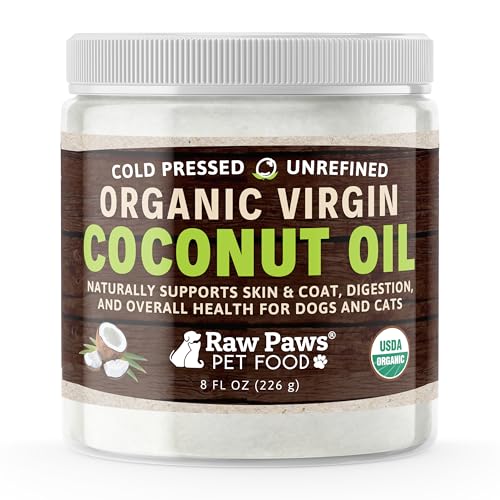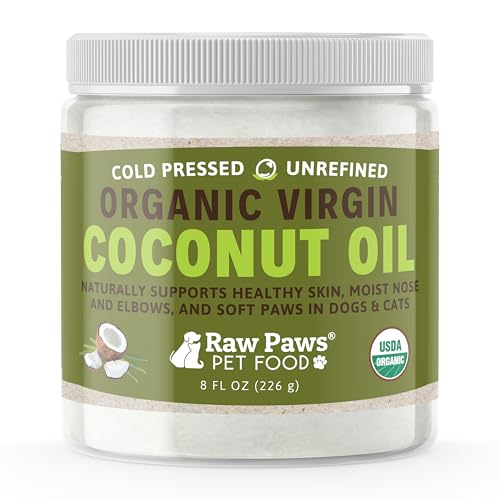Benefits of Coconut Oil for Cats
As a cat lover, you want the best for your furry companion. Did you know that coconut oil can provide many benefits for your cat’s health and well-being? Here’s why coconut oil deserves a spot in your cat care routine:
1. Healthy Skin and Coat
Coconut oil is a natural moisturizer that can help soothe dry and itchy skin in cats. It’s packed with essential fatty acids that promote a healthy, shiny coat. By applying a small amount of coconut oil to your cat’s skin, you can provide relief from dryness and improve their overall skin health.
2. Hairball Control
Hairballs are a common issue for cats, especially those with long hair. Coconut oil can help reduce the formation of hairballs by promoting healthy digestion. It acts as a lubricant, making it easier for hairballs to pass through the digestive system. Adding a small amount of coconut oil to your cat’s food can help prevent uncomfortable hairball-related incidents.
3. Immune System Boost
Coconut oil contains lauric acid, a compound known for its antimicrobial and antiviral properties. When ingested, this nutrient can support your cat’s immune system, helping them fight off infections and stay healthy. Adding coconut oil to your cat’s diet can be a simple and effective way to boost their overall immunity.
4. Digestive Health
If your cat suffers from digestive issues like constipation or diarrhea, coconut oil may provide relief. The medium-chain fatty acids found in coconut oil can help improve the absorption of nutrients in the digestive system. This can aid in regulating bowel movements and promoting a healthy gut.
5. Nutritional Support
In addition to its numerous health benefits, coconut oil is also a rich source of essential nutrients such as vitamins E and K. These vitamins contribute to your cat’s overall well-being and can support their growth, development, and energy levels.
Coconut oil is a versatile and natural product that can improve your cat’s health inside and out. From promoting a lustrous coat to boosting their immune system, incorporating coconut oil into your cat’s routine can have a positive impact on their quality of life. Consult with your veterinarian to determine the appropriate dosage and usage for your feline friend.
Moisturizing Properties of Coconut Oil
If you’ve ever noticed your cat scratching excessively or suffering from dry and itchy skin, coconut oil may be just the solution you need. Coconut oil is not only a delicious and healthy treat for humans, but it can also work wonders for your feline friend’s skin and coat.
- Soothing effect: Coconut oil has natural soothing properties that can help alleviate irritation and itchiness on your cat’s skin. By applying a small amount of coconut oil to the affected areas, you can provide relief and prevent your cat from incessantly scratching.
- Deep hydration: Coconut oil acts as a natural moisturizer, penetrating deep into the skin to provide hydration. It helps replenish the moisture lost due to dryness, leaving your cat’s skin feeling soft and supple.
- Enhanced coat texture: Regularly applying coconut oil to your cat’s fur can help improve its texture and shine. The oil helps restore moisture to dry and brittle hair, making it healthier and less prone to breakage.
- Prevention of dryness: Dry skin can lead to flakiness and discomfort for your cat. Coconut oil creates a barrier on your cat’s skin, sealing in moisture and preventing it from drying out. This helps maintain optimum skin health and prevents the formation of dry patches.
- Natural antibacterial and antifungal properties: Coconut oil contains lauric acid, a fatty acid that has powerful antibacterial and antifungal properties. These properties can help fight skin infections and keep your cat’s skin healthy.
Remember, when using coconut oil on your cat’s skin, always start with a small amount and observe any reactions. It’s important to choose unrefined, cold-pressed coconut oil to ensure it’s free from chemicals and additives that could be harmful to your cat.
Promoting a Shiny and Healthy Coat
One of the many benefits of using coconut oil for your cat is its ability to promote a shiny and healthy coat. A cat’s coat is not only beautiful but also acts as a protective barrier against the elements. Here are some ways coconut oil can help enhance your cat’s coat:
Moisturizing properties: Coconut oil is a natural moisturizer that can help soothe dry and itchy skin. By applying coconut oil to your cat’s coat, you can alleviate any discomfort and give them relief from skin irritations.
Deep hydration: Coconut oil has the ability to penetrate the skin and provide deep hydration. This can help to prevent dryness and maintain the natural moisture balance of your cat’s coat. A well-hydrated coat is less prone to damage and breakage.
Enhanced texture: Regular use of coconut oil can improve the overall texture of your cat’s coat. It can make the fur softer, smoother, and more manageable. Imagine snuggling up to your cat and feeling their luxurious and silky coat!
Prevents dryness: Dryness can make your cat’s coat look dull and lifeless. Coconut oil can help to prevent this by locking in moisture and keeping the coat well-nourished. A well-moisturized coat not only looks healthier but is also less prone to tangles and matting.
Natural antibacterial and antifungal properties: Coconut oil contains lauric acid, which has natural antibacterial and antifungal properties. This can help to prevent skin infections and keep your cat’s coat clean and healthy. A healthy coat means a happy and comfortable kitty.
To promote a shiny and healthy coat for your furry friend, start by warming a small amount of unrefined, cold-pressed coconut oil in your hands. Gently massage it into your cat’s coat, focusing on any dry or flaky areas. Observe your cat’s reaction and adjust the amount of coconut oil accordingly.
Remember to introduce coconut oil gradually and monitor your cat’s response. Each cat is unique, and while most cats tolerate coconut oil well, some may have sensitivities or allergies. If you notice any adverse effects, discontinue use and consult your veterinarian.
Boosting Your Cat’s Immune System
As a cat lover, you want to do everything you can to keep your furry friend healthy and happy. One way to do that is by boosting their immune system. A strong immune system helps your cat fight off illnesses and stay strong. Coconut oil can be a great addition to your cat’s diet to give their immune system a boost. Here’s why:
- Antiviral and antibacterial properties: Coconut oil contains lauric acid, which has antiviral, antibacterial, and antifungal properties. This means it can help protect your cat against harmful microorganisms that can cause infections.
- Rich in essential fatty acids: Coconut oil is a good source of essential fatty acids, such as linoleic acid and lauric acid. These fatty acids are important for supporting your cat’s immune system and overall health.
- Anti-inflammatory effects: Inflammation is a common response to infection or injury. Coconut oil contains compounds that have anti-inflammatory effects, which can help reduce inflammation and support your cat’s immune system.
- Digestive health: A healthy gut is crucial for a strong immune system. Coconut oil can help improve your cat’s digestion and promote a healthy gut flora.
So how can you incorporate coconut oil into your cat’s diet? Start by consulting your veterinarian to make sure it’s safe for your cat and determine the appropriate amount to give. Gradually introduce coconut oil into their diet to allow their system to adjust. You can add a small amount to their food or offer it as a treat a few times a week.
Remember, while coconut oil can be beneficial for your cat’s immune system, it’s important to use it in moderation. Too much coconut oil can lead to digestive upset or weight gain. Be sure to monitor your cat’s response and adjust the amount if needed.
Sources:
- Health Benefits of Coconut Oil for Cats
- [Coconut Oil for Pets: Uses, Benefits, and Tips!](
Aid in Digestion for Cats
As a cat lover, you want to ensure that your feline friend is happy and healthy. Did you know that coconut oil can actually aid in digestion for cats? It’s true! Incorporating coconut oil into your cat’s diet can have several benefits for their digestive system. Let’s explore how coconut oil can help improve your cat’s digestion.
Soothe Digestive Issues
Coconut oil contains medium-chain fatty acids (MCFAs), such as lauric acid, caprylic acid, and capric acid. These MCFAs have antimicrobial and antifungal properties that can help soothe your cat’s digestive issues. If your cat experiences occasional diarrhea, constipation, or an upset stomach, coconut oil can provide relief by promoting a healthy balance of bacteria in their gut.
Aid Nutrient Absorption
Having a well-functioning digestive system is crucial for your cat to effectively absorb nutrients from their food. Coconut oil can help enhance nutrient absorption by supporting the health of your cat’s intestines. This means that your cat will be able to get more essential vitamins, minerals, and nutrients from their food, leading to improved overall health.
Prevent Hairball Formation
Hairballs can be a common issue for cats, especially those with long hair. Coconut oil can help prevent the formation of hairballs by lubricating your cat’s digestive tract. When your cat ingests coconut oil, it forms a slippery barrier that allows hair to pass through their system more easily, reducing the likelihood of hairball formation and associated discomfort.
How to Incorporate Coconut Oil into Your Cat’s Diet
Before adding coconut oil to your cat’s diet, it’s important to consult with your veterinarian to determine the appropriate amount for your cat based on their weight and health condition. Introduce coconut oil gradually to avoid any digestive upset.
To incorporate coconut oil into your cat’s diet, simply mix a small amount (about 1/4 to 1/2 teaspoon) of coconut oil into their food. Start with a smaller amount and gradually increase the dosage as recommended by your veterinarian. Remember, moderation is key, as excessive coconut oil consumption can lead to weight gain in cats.
By adding coconut oil to your cat’s diet, you can help support their digestion and overall well-being. Always consult your veterinarian before making any dietary changes for your cat to ensure their health and happiness.
Hairball Control with Coconut Oil
If you’re a cat lover, you know that hairballs can be a common issue for our feline friends. The constant grooming that cats engage in can lead to the accumulation of hair in their digestive system, causing uncomfortable and messy hairballs.
But did you know that coconut oil can help control hairballs in cats? It’s true! Coconut oil’s unique properties can work wonders for your cat’s digestive health, ensuring a happier and healthier kitty.
- Lubricates the Digestive Tract: Coconut oil acts as a natural lubricant for the digestive tract, making it easier for hairballs to pass through your cat’s system without causing discomfort.
- Prevents Hairball Formation: By regularly giving your cat a small amount of coconut oil, you can help prevent the formation of hairballs in the first place. The oil’s lubricating effect keeps the hair moving through the digestive system, reducing the likelihood of hairball formation.
- Enhances Digestive Health: Coconut oil contains medium-chain fatty acids (MCFAs) that have antimicrobial and antifungal properties, promoting a healthy balance of bacteria in your cat’s gut. This can help alleviate digestive issues and improve overall digestive health.
- Promotes Nutrient Absorption: The MCFAs in coconut oil not only aid in digestion but also enhance nutrient absorption. This means that your cat will get more out of their food, leading to better overall health and well-being.
It’s important to note that while coconut oil can be beneficial for hairball control, moderation is key. Consult with your veterinarian to determine the appropriate amount to give your cat based on their size and individual needs. Gradually introduce coconut oil into your cat’s diet to avoid any potential digestive upset.
Conclusion
Using coconut oil for your cat can have numerous benefits for their overall health and well-being. Not only can it promote a shiny and healthy coat, but it can also soothe dry and itchy skin, provide deep hydration, and prevent skin infections. Coconut oil’s natural antibacterial and antifungal properties make it a great addition to your cat’s skincare routine.
In addition to its effects on the skin, coconut oil can also boost your cat’s immune system. The lauric acid in coconut oil has antiviral, antibacterial, and antifungal properties that can help keep your cat healthy. The essential fatty acids in coconut oil support the immune system and have anti-inflammatory effects.
Furthermore, coconut oil can aid in digestion for your cat. It acts as a natural lubricant for the digestive tract, preventing hairball formation and promoting digestive health. The medium-chain fatty acids in coconut oil have antimicrobial and antifungal properties that promote a healthy balance of bacteria in the gut and improve nutrient absorption.
Remember to consult your veterinarian before adding coconut oil to your cat’s diet and gradually introduce it to avoid digestive upset. With the right approach, coconut oil can be a beneficial addition to your cat’s daily routine.
Frequently Asked Questions
Q: How can coconut oil benefit my cat’s coat?
A: Coconut oil can promote a shiny and healthy coat for your cat. It moisturizes dry and itchy skin, provides deep hydration, enhances coat texture, and prevents dryness. It also has natural antibacterial and antifungal properties to help prevent skin infections.
Q: Can coconut oil boost my cat’s immune system?
A: Yes, coconut oil can boost your cat’s immune system. It contains lauric acid, which has antiviral, antibacterial, and antifungal properties. Coconut oil is also rich in essential fatty acids that support the immune system and has anti-inflammatory effects.
Q: How can coconut oil aid in digestion for cats?
A: Coconut oil acts as a natural lubricant for the digestive tract, preventing hairball formation and enhancing digestive health in cats. It contains medium-chain fatty acids (MCFAs) that have antimicrobial and antifungal properties, promoting a healthy balance of bacteria in the gut and improving nutrient absorption.
Q: Should I consult a veterinarian before adding coconut oil to my cat’s diet?
A: Yes, it is recommended to consult a veterinarian before adding coconut oil to your cat’s diet. They can provide personalized advice and ensure it is safe for your cat’s specific needs. It is also important to gradually introduce coconut oil to avoid any potential digestive upset.

















